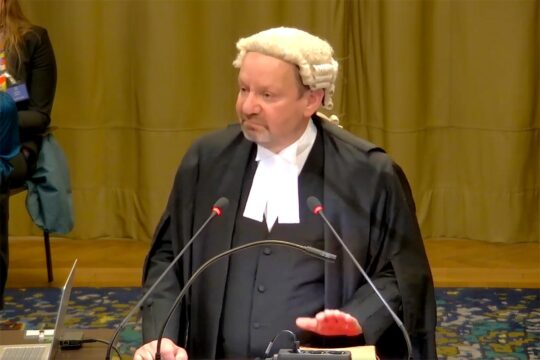Brussels, April 25, 2007 (FH) – “You will need to judge what is impossible to imagine,” investigating Judge Damien Vandermeersch told jurors at the Court of Assises in Brussels which must decide on the participation of Bernard Ntuyahaga i the assassination of ten Belgian Blue Helmets from the UNAMIR and that of multiple Rwandan figures during the 1994 genocide.
Damien Vandermeersch, judge in charge of investigating the case from 1995 to 2004, placed his work in the context of the genocide: “I must present to you today what is not possible: which could not exist. My assignment tells me that it is the work of man which did that which is the hardest memory of my life,” he said, visibly affected. “We’re talking about 800,000 to 1 million murders. A genocide, it’s a lot of people. These are numbers, but they are also our Blue Helmets, men, women, children. We tell ourselves that it can’t be true. But what is true is that it has been investigated and it’s true that you must judge,” he continued in his testimony before the Court of Assises in Bussels.
After a lengthy recollection of the chronology of the investigation, he asked the jurors to consider the whole file: “I’ve already had large files, but never like this. It wasn’t one ethnic group against another, it’s more complex than that. This context allows it to be understood how people could have acted in a way that wasn’t expected.” Also, according to him, “There are contradictions in certain testimonies. It is possible that some people aren’t telling the truth. It’s also possible that it’s just one biased point of view: one witness comes with what he saw. In addition, time has gone by. The contradictions also show that the testimonies weren’t prepared in advance,” he added. Mr. Luc de Temmerman, Bernard Ntuyahaga’s lawyer, stated earlier that “Mr. Vandermeersch conducted the prosecution’s investigation.”
The investigating judge also regretted “the lack of means” which slowed down his investigation: “I had hoped to submit this to you quicker.” He also recalled, among other obstacles to his work, the refusal of the United Nations to allow him to hear from General Romeo Dallaire. “I think that the UN maybe feared we might be too incisive on this sensitive subject. Meanwhile General Dallaire granted interviews and even wrote a book,” he stressed. Romeo Dallaire, head of the United Nations Assistance Mission for Rwanda (UNAMIR) in 1994, should testify on May 10 at the Court.
The day was also marked by an incident provoked by Mr. Temmerman. Absent during the examination during the morning so as to not influence his client, Bernard Ntuyahaga’s lawyer did not appreciate that his colleagues asked him about the deposition of Colonel Nubaha, former Commander of Camp Kigali, who Mr. Temmerman himself sought out in the DRC last week. He accused his colleagues of being there for “fame and for the cameras.” This elicited apologies. President Karine Gerard had to suspend the hearing so that the lawyers could settle their argument at the bar.
Major Bernard Ntuyahaga, official in charge of logistics at the Kigali military camp in 1994, is accused of the assassination of ten Belgian Blue Helmets from the UNAMIR on April 7, 1994, as well as that of the Prime Minister at the time, Agathe Uwilingiyimana and of other Rwandan figures in Kigali and Butare between April 6 and July 5, 1994. This trial is taking place because of the law known as “universal jurisdiction” which permits, under certain conditions, Belgian courts to try foreign planners of crimes against humanity committed abroad.
Bernard Ntuyahaga’s examination finished yesterday. The trial opened April 19 and should last at least 2 months: more than 150 witnesses will be heard by the Court of Assises in Brussels starting today.
BF/PB/KD
© Hirondelle News Agency



